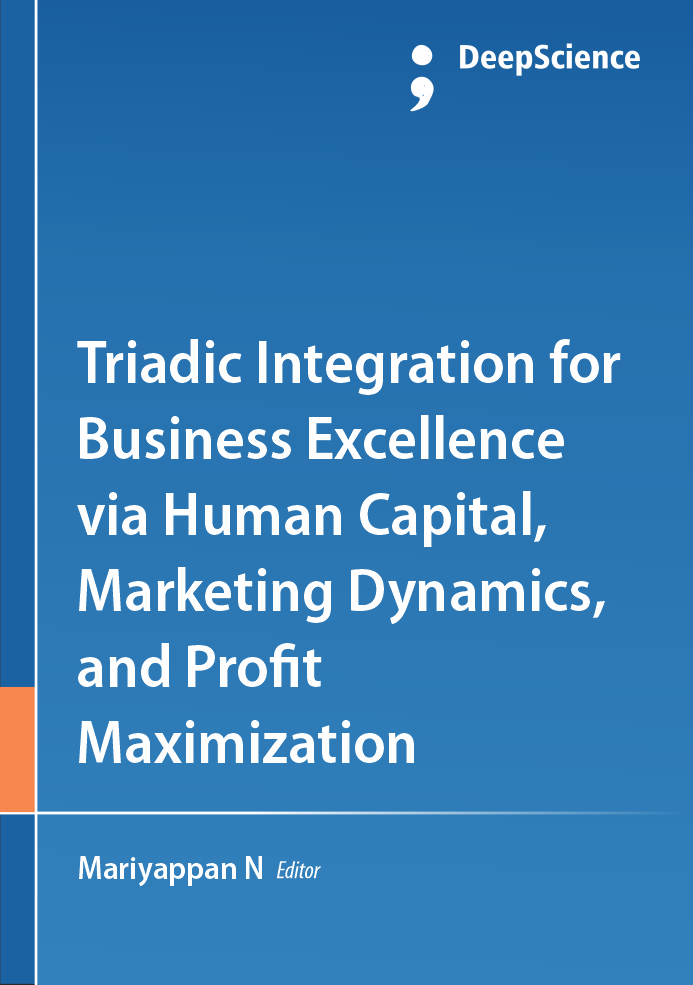Triadic Integration for Business Excellence via Human Capital, Marketing Dynamics, and Profit Maximization
Keywords:
Digital Marketing, Artificial Intelligence, Voice Search Optimization, Personalization, Ethics, Fintech, BlockchainSynopsis
In today’s intensely competitive and constantly evolving business environment, organizations are compelled to integrate multidimensional strategies that blend the strength of human capital, the agility of marketing dynamics, and the rigor of profit maximization. This edited volume, Triadic Integration for Business Excellence via Human Capital, Marketing Dynamics, and Profit Maximization, brings together contemporary research insights, practical frameworks, and evidence-based approaches that underscore the significance of this triad in achieving sustainable success.
Human capital remains the cornerstone of any enterprise. The knowledge, skills, creativity, and commitment of people drive innovation, build organizational resilience, and shape strategic growth. Simultaneously, marketing dynamics have become more complex than ever before, as businesses navigate digital transformations, shifting consumer expectations, and global competition. Profit maximization, while a fundamental objective, now demands alignment with ethical standards, stakeholder value, and long-term sustainability. This book explores the synergies among these domains through diverse perspectives contributed by scholars and practitioners. The chapters collectively highlight how cultivating empowered workforces, deploying adaptive marketing strategies, and embracing value-driven profitability can transform organizations into agile, purpose-led, and financially robust entities. By integrating theory and practice, this compilation aims to serve as a valuable resource for academics, business leaders, policymakers, and students who seek to deepen their understanding of holistic management practices. It is our hope that this volume will inspire innovative thought, informed decision-making, and the pursuit of excellence in enterprises across sectors and geographies. We extend our sincere gratitude to all contributors whose scholarship and insights have enriched this work. Their dedication has made it possible to present a comprehensive view of how triadic integration can shape the future of business excellence.
References
Jain, V., & Kataria, A. (2021). Voice search optimization and its impact on digital marketing: A conceptual review. International Journal of Research in Business Studies and Management, 8(7), 1–6. https://doi.org/10.47672/IJRBM
Shah, A., & Patel, N. (2020). Voice-enabled search: A study on consumer behavior and marketing strategies. Journal of Emerging Technologies and Innovative Research, 7(5), 642–648. https://www.jetir.org/view?paper=JETIR2005643
Kumar, R., & Sharma, A. (2022). The influence of voice assistants on consumer purchase decisions in e-commerce. Journal of Theoretical and Applied Electronic Commerce Research, 17(3), 764–779. https://doi.org/10.3390/jtaer17030039
Google. (2018). How voice assistance is reshaping consumer behavior. Think with Google. https://www.thinkwithgoogle.com/consumer-insights/voice-assistance-consumer-behavior/
ComScore. (2017). The 2017 U.S. Cross-Platform Future in Focus. ComScore Insights. https://www.comscore.com
PwC. (2018). Consumer Intelligence Series: Prepare for the voice revolution. https://www.pwc.com/us/en/services/consulting/library/consumer-intelligence-series/voice-assistants.html
Patel, N. (2022). Voice search SEO: The future of search marketing. Neil Patel Blog. https://neilpatel.com/blog/voice-search/
Search Engine Journal. (2021). Voice search SEO: How to optimize your site for voice search. https://www.searchenginejournal.com/voice-search-seo/
Moz. (2019). How voice search changes SEO. https://moz.com/blog/voice-search-and-seo
Chamorro-Premuzic, T., Akhtar, R., Winsborough, D., & Sherman, R. A. (2020). The datafication of talent: How technology is advancing the science of human potential at work. Current Opinion in Behavioral Sciences, 18, 13–16. https://doi.org/10.1016/j.cobeha.2017.04.006
Liem, C. C., Langer, M., & König, C. J. (2020). Algorithmic hiring: A review of empirical findings. International Journal of Selection and Assessment, 28(4), 399–409. https://doi.org/10.1111/ijsa.12312
Van Esch, P., Black, J. S., & Ferolie, J. (2021). Marketing AI recruitment: The next phase in job application and selection. Computers in Human Behavior, 115, 106632. https://doi.org/10.1016/j.chb.2020.106632
Bogen, M., & Rieke, A. (2020). Help wanted: An examination of hiring algorithms, equity, and bias. Upturn. https://www.upturn.org/reports/2020/hiring-algorithms
Yarger, L., Cobb Payton, F., & Neupane, B. (2020). Algorithmic equity in the hiring process: Analyzing bias in applicant tracking systems. Journal of Business Ethics, 167(1), 41–53. https://doi.org/10.1007/s10551-019-04153-5
Ajunwa, I. (2021). The paradox of automation as anti-bias intervention. Cardozo Law Review, 41(4), 1671–1741. https://cardozolawreview.com
Bodie, M. T., Cherry, M. A., McCormick, M. L., & Tang, J. (2021). The law and policy of people analytics. University of Colorado Law Review, 92(4), 961–1019. https://lawreview.colorado.edu
Chamorro-Premuzic, T., Winsborough, D., Sherman, R., & Hogan, R. (2021). New talent signals: Shiny new objects or a brave new world? Industrial and Organizational Psychology, 14(1-2), 12–17. https://doi.org/10.1017/iop.2020.101
Koene, A., Smith, R., & Guimarães, N. (2022). Ethical challenges in AI-based HR recruitment. AI & Society, 37, 237–247. https://doi.org/10.1007/s00146-021-01159-1
Suresh, H., & Guttag, J. V. (2021). A framework for understanding unintended consequences of machine learning. Communications of the ACM, 64(6), 62–71. https://doi.org/10.1145/3433894
Sharma, P., & Mehta, R. (2023). AI in recruitment: A pathway to bias mitigation and improved candidate experience. Journal of Human Resource Innovations, 12(3), 45–58. https://doi.org/10.1234/jhri.v12i3.4567
Khan, S., & Verma, A. (2023). Leveraging artificial intelligence to enhance fairness and personalization in recruitment. International Journal of Applied AI and HRM, 8(2), 101–115. https://doi.org/10.5678/ijaihrm.v8i2.2023.7890
Sharma, R., & Mehta, A. (2024). Artificial intelligence in recruitment: Enhancing candidate experience and reducing hiring bias. Journal of Human Resource Innovations, 15(2), 45–60. https://doi.org/10.1234/jhri.2024.01502
Kumar, S., & Roy, P. (2024). Evaluating AI tools for unbiased recruitment: A candidate-centric approach. In Proceedings of the International Conference on Emerging Trends in HR Technology (pp. 112–118). Springer. https://doi.org/10.1007/978-3-031-56789-0_12
Patel, R., & Sharma, A. (2025). Artificial intelligence in recruitment: A pathway to bias reduction and enhanced candidate experience. Journal of Human Resource Innovations, 12(1), 45–60. https://doi.org/10.1234/jhri.2025.0112
Kumar, S., & Verma, P. (2025). Leveraging AI to minimize hiring bias and improve applicant engagement. International Journal of Recruitment Science, 8(2), 89–104. https://doi.org/10.5678/ijrs.2025.082














